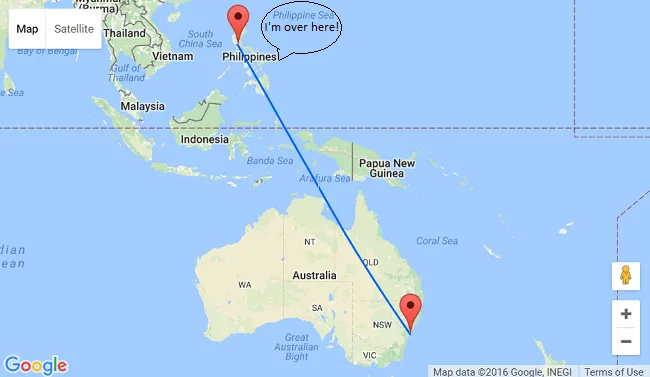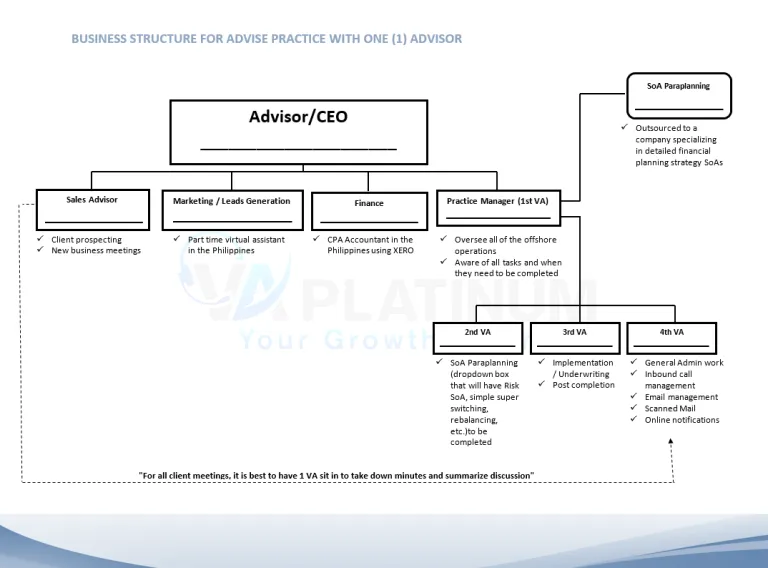VA Platinum Insights
Stay connected with us to receive regular updates and new blog content. Simply subscribe today!


Explore Our Latest Articles


5 Things to Expect When Working with Filipino Virtual Assistants
“What is it like working with staff who are thousands of kilometres away?”
I get this question a lot.
A lot of financial advisers, mortgage brokers, real estate agents, and business owners enlist the services of virtual assistants these days.
Those who haven’t, are curious about what to expect.
People worry that the cultural gap is too wide.

However, working with offshore staff is not complicated.
I’ve experienced so many benefits working with virtual assistants in the Philippines that I didn’t mind not having a physical office or not having my staff physically in front of me.
In fact, I preferred it.
So, here’s what you should expect when working with virtual assistants from the Philippines:
1. Expect a superstar

You’ll be working with a superstar staff member and this should be the minimum expectation!
If you approach it with low expectations, you won’t give enough time and effort into ensuring you hire the right person.
I’ve emphasised in previous blogs how important it is to take time in interviewing applicants and finding the best person for the role.
This way, you’ll be investing time and energy in training and developing staff who are dedicated to their work and produce results.
Put enough time and energy into your virtual assistant and you will get someone who will surpass your expectations.
They will be productive for 7.5 hours a day.
I know this because Time Doctor monitors the work being done!
Staff are focused on their tasks and output is maximised.
2. Expect to treat them like they’re right there with you
Sure they’re 4,000 kilometres away but hear me out.
You should develop a great relationship with your virtual assistant.
Say “good morning” and “good night”. Discuss the weekend, share a joke!
Your virtual assistant has likes, dislikes, interests, and personality traits. Get to know them as you would their Australian counterpart.
Heck, plan a working holiday! If at all possible, visit the Philippines.
Make an effort to understand how your virtual assistant lives. Get to know what day-to-day life looks like.
Understand the economic environment, the transport system, and everyday things that your Filipino staff experience that is different from Australia.
This should give you a glimpse of the world through their eyes.
Here’s a scenario:
Your virtual assistant tells you that they need to go to the bank and they’re gone for an hour.
You’d be frustrated right?
As an Aussie, we’re used to being served in 5 minutes.
Who needs an hour to go to the bank?
What you don’t know is that the lines are RIDICULOUSLY LONG at banks in the Philippines.
I’m not kidding when I say that a bank queue goes out the door…. and around the corner.
Understanding how your staff live and getting to know them will give you a better perspective on how they work.
Embrace a personal connection.
3. Expect a lot of video calls

Arrange video calls with your staff, at least during the first few months with them.
I encourage clients to spend at least an hour during the morning for training and at least two half-hour sessions during the afternoon for Q and A when working with a new virtual assistant.
Whilst it can be done over the phone, video calls are more effective.
About 90% of communication is non-verbal (body language and tone), so how you present is actually more important than what you say.
I’ve spoken to virtual assistants who have misunderstood my message because they couldn’t see my face!
As soon as we started using video as the main tool, communication became much easier.
Lesson learnt: video call your virtual assistant through Skype and have face to face conversations as often as possible.
4. Expect to be more productive
This is the biggest win when working with virtual assistants.
Previously when I had an office and lots of staff sitting nearby, I would get interrupted every 5 to 10 minutes with a question.
I could go through a whole day and not finish a single 30-minute task because of never-ending interruptions.
When your momentum is disturbed, it usually takes a few minutes to get back into the groove.
I would go to a cafe or a park with my laptop, turn off my phone, and work there so I wouldn’t get distracted.
That was a crazy work set-up, and I’m so glad I’ve moved on.
Thanks to my virtual assistants, I now work from home and help other business owners enjoy the same benefits.
I’m more productive and I’m happier!
I have time to play with my son, exercise, read a book…
I know a lot of business owners who use our virtual assistant services also feel the same way.
5. Expect fun
“There is little success where there is little laughter.” – Andrew Carnegie (Entrepreneur)
Honestly, the fun and energy I’ve experienced from Filipino culture outweigh anything I’ve experienced in Australia.
We have breakfast in the office every morning, and I have staff who dance and sing while we’re eating!
They’re a fun and quirky bunch. You can feel their positive energy even through the computer screen.
This amazes me.
What is more amazing is how contagious it is. The positivity and liveliness are evident in everything they do, and it rubs off on you.
It lifts you up. It’s the type of energy you’d want to feel when working with staff.
This is why, I think, they make awesome staff members.
The benefits of getting virtual assistants are life-changing.
Not only for your business, but you also get a fresh and different life perspective by getting to know and understand your offshore staff.
Although you are thousands of kilometres away, expect the best from your virtual assistants and you’ll appreciate the best staff you’ve ever had.
These are my top 5 observations, but I’m sure that other business owners who work with Filipino virtual assistants have more to add.
Have you worked with a virtual assistant yet? Contact us.

.webp)
How to Grow Your Advice Practice with Offshore Virtual Assistants
Many advisers start off by structuring their advice practice business through trial and error to see what might work.
But what if I tell you there’s a way to skip the experiments and proceed with a structure that’s proven to work?
Good stuff, right!
In this article, I provide you with the ideal business structure specifically tailored for Advice Practices with One (1) Adviser and multiple support staff.
Building a business structure is critical to any growing business. It’s the framework that dictates job roles and decision-making responsibilities. It helps the business move forward with the least expense and smoothly.
Let’s face it, even though you have the business vision, there are roles you cannot force yourself into. It’s good to be an enthusiastic jack-of-all-trades, but juggling all tasks might stall your growth or leave you burnt out.
Understanding your strengths and weaknesses is a critical insight into running your company.
Direct your focus on doing what it is that you do best and find the right people with the right talent to assist you.
Whether you are in Financial Planning, Mortgage Broking, or an Insurance Planning business, this structure will help you strengthen your own virtual workplace.
Fig.1

Below, I share with you how each role is ideally incorporated into your business practice.
Adviser/CEO
Being an adviser is a whole combination of responsibilities in itself. Other than servicing clients by giving professional financial advice and solutions, you are also managing client relationships and maintaining the business practice.
Additionally, as the highest-ranking executive in the company, you are responsible for making major business decisions, managing the overall operations and resources of the company, planning overall growth, delegating tasks to other managers or various departments, and lastly, hiring staff.
1. Sales Advisers
This department is responsible for generating and attracting new clients whilst making sure that the services you offer are well-presented and well-received.
In the advice practice, sales advisers focus primarily on client prospecting and building client relationships.
While you are responsible for giving the actual professional advice, your sales adviser is responsible for onboarding new clients and making sure that they understand your process and practice. They are also responsible for initiating new business meetings and finds you a way to build and widen your client network.
In our company, my business partner Ed Arguelles and I are in the frontline of building client relationships. I do most of the business management and Ed takes care of the onboarding for client prospects and new clients.
2. Finance
This department tracks the finances and ensures that any gains or losses are appropriately managed and circulated.
The Finance Office role can be filled in by an offshore staff – ideally, a Certified Public Accountant in the Philippines who is knowledgeable about the use of XERO.
3. Practice Manager
This department oversees and manages all offshore operations.
Your Practice Manager is your 1st Virtual Assistant, there to take care of coordinating and delegating tasks to other team members. This staff will also be your main point of contact for any admin-related concerns or tasks.
The Practice Manager is also responsible for reviewing staff performance, training, and coaching.
Under the Practice Manager, there are the following available roles:
SoA Paraplanning
You can get SoA Paraplanning outsourced to a company specialising in detailed financial planning strategy SoAs. This is the best option if you’re not ready to hire an in-house or offshore full-time paraplanner at the moment.
It’s easy to find firms that offer this service. A simple “Googling” will give you a great number of options. The fees vary depending on the number of SoAs you need in a week and the number of hours the paraplanners allot to it.
Your practice manager will handle communication to any outsourcing firm of your choice and make sure that the documents are complete, accurate, and are compliant.
General Admin Virtual Assistants
You would need additional staff to focus on specific aspects of administrative work. Having enough people in your team allows room for backup, in case some of your staff are not able to come into work.
Here’s my suggested task allocation for 3 more staff:
2nd Virtual Assistant
Your 2nd VA is your SoA Paraplanning support. This particular staff will take care of Risk SoA, simple super switching, rebalancing, etc.
Here are other tasks they do:
You would need additional staff to focus on specific aspects of administrative work. Having enough people in your team allows room for backup, in case some of your staff are not able to come into work.
- Updating client paper and electronic files, ensuring that they are compliant
- Completing, checking, submitting, and processing the necessary application forms
- Preparing basic SoA’s such as life insurance only and superannuation rollovers (for strategy-based SoA’s we can establish a relationship for you with specialised SoA paraplanners)
- Preparing Record of Advice
- Entering client data into financial planning software
- Liaising with fund managers, administrators and life companies regarding client’s financial situation
- Assisting with research into client recommendations
- Monitoring stationery, ensuring always sufficient supply and not out of date
3rd Virtual Assistant
Your 3rd VA will handle administrative tasks relating to Implementation and Underwriting. They will also take care of handling any post-completion process and concern.
Here are other tasks they do:
- Contacting clients for outstanding underwriting or admin requirements, contacting insurers when changes need to be done on the application (name incorrectly spelled, DOB, address, etc.), making sure policies go into force as soon as possible
- Ensuring regulatory compliance of Sales Paraplanners and Advisers
- Reviewing and submitting the application
- Verifying all documents are completed/signed fully and correctly
- Scheduling client appointment
- Managing medical requirements
- Organising/following up on any outstanding requirements (e.g., financial documents, superfund details, rollover forms) if applicable
4th Virtual Assistant
Your 4th Virtual Assistant will handle both inbound and outbound calls, email management, scanned mail, online notification, and other ad hoc administrative work.
- Managing incoming emails, mail, faxes & message bank
- Assisting with client appointment booking, researching into the client, recommendations, quoting, processing, filing, and preparing client documents
- Liaising with fund managers, administrators, and life companies regarding client affairs
- Client service e.g. attends to client query and request
- Maintenance of client databases and creation of files
- Assist with management reporting on a monthly basis or as required
- Processing applications, renewals or changes to existing client records
- Ensuring regulatory compliance
- Data Entry
I also added an auxiliary role to support sales. I have made this department a stand-alone, granted that the task can be one-off or outsourced part-time, rather than full-time.
4. Marketing & Lead Generation
Basically, this department is responsible for handling Digital Marketing campaigns and lead generation.
Digital Marketing has already been a constant effort of business who wants to keep their practices social media relevant.
Your Marketing & Lead Generation department can be handled by a part-time Virtual Assistant in the Philippines who has knowledge of different Digital Marketing campaigns. It’s a great bonus if you can find someone who knows how to manage your website and produce content.
Part of the task includes getting email contact from LinkedIn, Facebook, or other sources.
Other tasks may include:
- Updating the website feature without the need for coding
- Building email marketing campaigns
- Creating and managing social media accounts
- Writing digital content for blogs, articles and other social media posts
- Writing, publishing and managing blog content
- Generating reports from MailChimp, Facebook and Google Analytics
For all of you planning to start your own advice practice, it is important to start with a firm foundation. However, as your business develops, it’s just natural to make adjustments to adapt to any change that comes with growth.

.webp)
6 Tips to Improve the Likelihood of First Touch Loan Approval
Whenever I talk to brokers about their ambitious targets for the year ahead, I find it’s all too easy to get lost in the metrics of leads and settlements as Key Performance Indicators.
What happens in between these two milestones is more important than ever to achieving success in your broking business. Lending policies are as murky as they’ve ever been and we are expecting the recent tight credit assessment standards to continue over the coming 12 months.
So with keen-eyed assessors more often than not looking for reasons to defer/decline instead of approving, it’s a great time to start measuring your application efficiency – how many of your submissions are actually approved? How many are approved the first time they are picked up by an assessor?
The results of our most recent round of efficiency audits showed some consistent, avoidable inefficiencies across a number of diverse broker businesses. The resounding learning I’ve had is that the submit-it-and-see strategy doesn’t work like it used to and ends up creating a lot more hassle for brokers and clients in the long run.
Here are the top 6 things we found to help improve the likelihood of first-touch loan approval:
1. Undisclosed liability checks
Far too many applications we analysed were returned with assessors wanting to clarify the outcome of credit enquiries. With access to upfront credit reports, this is a pretty easy one to address – line-by-line commentary on the outcome of every enquiry will prevent your client’s approval from being delayed.
2. Bank statement analysis
One of the biggest value-adds your VA can provide to your pre-submission process is to scour through bank statements to categorise living expenses, identify inconsistencies with client estimates, and flag any other potential undisclosed liabilities. Almost 40% of the avoidable delays we saw on loan approvals in June could have been prevented with a stronger bank statement analysis. Needless to say, we have developed a fairly robust system for this analysis which all our VAs can be trained on.
3. Seriously detailed submission notes
Assessors used to pick up the phone and call the broker to clarify little things about the applicants’ circumstances. These days, it’s far more likely they will push out a deferred letter seeking clarification, creating a week of back and forth replies and waiting in assessment queues. We’ve noticed recently that most assessors are actually reading submission notes and the more detailed, the better. Things like a line-by-line commentary on living expense categories, not unsuitable justifications of selected products, commentary on Afterpay/Zipmoney liabilities, and detailed exit strategies are the most useful notes to include.
3. Seriously detailed submission notes
Assessors used to pick up the phone and call the broker to clarify little things about the applicants’ circumstances. These days, it’s far more likely they will push out a deferred letter seeking clarification, creating a week of back and forth replies and waiting in assessment queues. We’ve noticed recently that most assessors are actually reading submission notes and the more detailed, the better. Things like a line-by-line commentary on living expense categories, not unsuitable justifications of selected products, commentary on Afterpay/Zipmoney liabilities, and detailed exit strategies are the most useful notes to include.
4. Minimum v. Comprehensive supporting docs
This one definitely goes against the grain compared to most brokers’ processes. I was always taught to only provide the bank with their minimum required documents for fear of opening up a can of worms when too much information is provided. My sense is that most brokers are the same, but this approach doesn’t lend itself well to an efficient process these days.
The minimum supporting document checklists (particularly when it comes to bank statements) are frequently insufficient to secure a first touch approval. Assessors – granted the discretion to request additional supporting documents – are exercising their right to request transaction and liability account statements. If you’ve done the above 3 steps as part of your process, then you should feel confident that providing these additional documents upfront will do more good than harm.
5. Delay lender selection
Every broker has their preferred lenders to deal with and has an idea of which lender will be suitable for a client in their early interactions of the sales process. Resisting the temptation to offer specific solutions to a client until all supporting documents are received will give you a much better chance to secure a first-touch approval. Our audits have shown that most occurrences where loan files need to be re-worked with a different lender could have been avoided by delaying the lender selection upfront.
6. Credit appetite hyper-awareness
Building on this delayed lender selection is having a real-time understanding of credit appetites across your preferred lenders. Policy documents alone don’t give the comfort they should anymore, so having your finger on the pulse is crucial. Lenders are dynamic in their approach towards applying policy as well as the internal top-down directives of how stringent the assessment should be. Something as simple as calling your BDM pre-submission to check whether they are ‘open for business’ or asking for their gut feel on a scenario is a great start. Participating in broker forums such as our new VA Platinum client Facebook page is another way to build this awareness and learn from other brokers’ successes or horror stories. Of course, your VA will have a good sense of which lenders are the flavour of the week based on their VA group chats, so you should feel comfortable getting their input here as well!
What do you think? Are loan files going around in circles because you haven’t updated your process to reflect the current lending environment? Could your VA help you build a more complete loan file upfront? Share your thoughts below or contact us to discuss how we can help improve your process.


Why the Philippines Is a Top Destination for Remote Job Virtual Assistant Talent
As businesses face increasing pressure to streamline operations, reduce costs, and maintain exceptional service quality, finding the right talent has never been more critical. For Australian businesses, the Philippines has emerged as a leading destination for skilled virtual assistants. The combination of talent, cost efficiency, and cultural alignment makes hiring a virtual assistant from the Philippines a strategic advantage – and VA Platinum is here to make that process seamless.
The Advantages of Hiring Virtual Assistants in the Philippines
1. Exceptional English Proficiency
English is a core part of the Filipino education system, with students learning the language from a very young age. This foundation has made the Philippines a global leader in English proficiency. In fact, the country ranks 2nd in Asia, only behind Singapore (according to Statista), for English language skills. Filipino virtual assistants excel in both written and spoken communication, ensuring seamless collaboration with Australian businesses and enhancing customer interactions.
2. Significant Cost Savings
Outsourcing to the Philippines offers businesses a chance to dramatically cut costs without sacrificing quality. Hiring a virtual assistant in the Philippines can result in savings of up to one-third of the salary you would typically pay for a similar role in Australia. These cost efficiencies go beyond wages, as you also save on overheads like office space, equipment, and benefits. By reallocating these resources, businesses can invest in growth strategies while enjoying the same, if not better, level of service.
3. Outstanding Work Ethic and Professionalism
Filipino virtual assistants are celebrated for their dedication, reliability, and adaptability. Their strong work ethic ensures tasks are completed on time and to a high standard, while their service-oriented mindset makes them ideal for client-facing and support roles.
4. Seamless Time Zone Alignment with Australia
The Philippine time zone is perfectly aligned with Australian business hours, allowing for real-time collaboration and faster turnaround times. Filipino virtual assistants can also provide flexible support tailored to your operational needs, whether during standard hours or after hours.
5. A Deeply Established Outsourcing Culture
The Philippines has a long history of serving as a top outsourcing destination, with a mature infrastructure and a highly experienced talent pool. Filipino VAs are well-versed in using advanced tools and adhering to global best practices, making them a reliable choice for businesses looking to outsource specialised or routine tasks.
6. Cultural Synergy for Easier Integration
Cultural compatibility between the Philippines and Australia ensures that Filipino VAs integrate smoothly into your team. Their collaborative and respectful nature makes them easy to work with, fostering trust and productive long-term partnerships.
7. Expertise Across Multiple Industries
From financial planning and mortgage broking to customer service and administrative support, Filipino VAs bring a wealth of knowledge and skills to the table. This broad expertise allows you to delegate a wide range of tasks confidently, freeing up your time to focus on high-value activities.
By outsourcing to the Philippines, businesses gain access to a unique combination of cost efficiency, exceptional talent, and a proven outsourcing culture, making it a strategic solution for sustainable growth.
Why Choose VA Platinum?
At VA Platinum, we specialise in providing Australian finance and mortgage broking firms with dedicated, highly skilled virtual assistants from the Philippines. Here’s why we are the outsourcing provider of choice:
- Industry Expertise: We understand the unique needs of finance and mortgage broking businesses. Our VAs are trained to handle tasks like loan processing, client communication, compliance checks, and more.
- Tailored Recruitment: We match you with VAs who possess the specific skills your business requires, ensuring a perfect fit for your team.
- Comprehensive Support: From onboarding to ongoing training, we support both clients and VAs to ensure long-term success.
- Data Security and Compliance: We prioritise data security, adhering to Australian standards to give you peace of mind when outsourcing critical tasks.
- Cost-Effective Solutions: By outsourcing with us, you can save up to 66% on salary expenses without sacrificing quality or efficiency.
Transform Your Business With VA Platinum
Outsourcing to the Philippines isn’t just about cost savings – it’s about unlocking the potential of a skilled and dedicated workforce. At VA Platinum, we help you harness these benefits, empowering your business to grow and thrive.
Don’t settle for less when you can have the best. Partner with VA Platinum today and experience why we’re the trusted choice for Australian finance and mortgage broking firms.
Ready to take the next step? Contact us to find your ideal virtual assistant.
Exploring Global Talent Solutions? Start Here.
Let us know about the roles or tasks you’d like to offshore in your business. Within a day or two, we’ll get back to you with insights and solutions tailored to your business.

